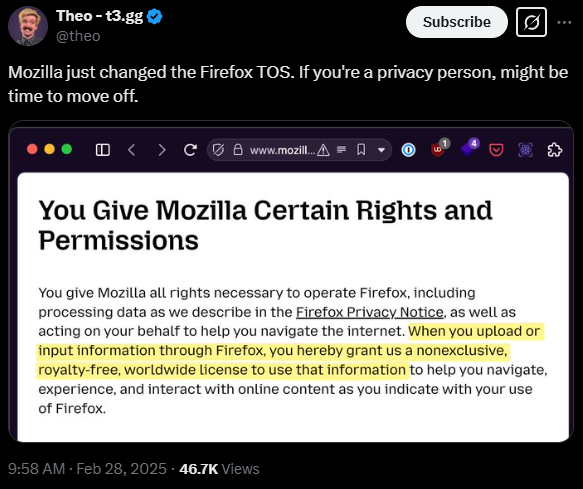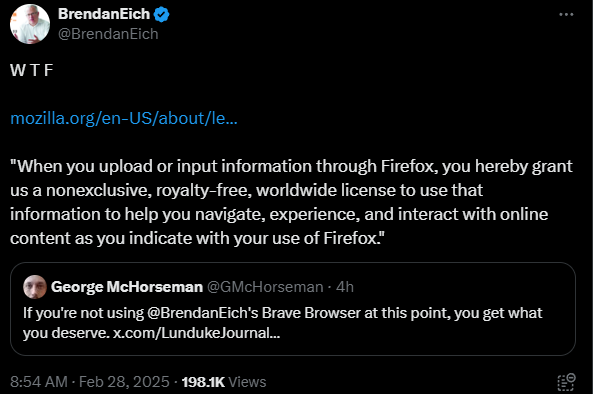
Can You Trust Mozilla Firefox in 2025?
Categories: Business, Cybersecurity, Data Privacy
Mozilla Firefox, a browser once synonymous with open-source ideals and user privacy, has recently introduced its first-ever Terms of Use, alongside an updated Privacy Notice. This move, detailed in a recent blog post, has sparked debate and raised questions about the future of privacy and trust in the browser.
Mozilla’s Rationale for the Changes
Mozilla explains that this shift is due to the evolving technological landscape. While they previously relied on their open-source license and public commitments, they now aim to provide clearer and more accessible explanations of user rights and permissions.
In their own words, they want to make their commitments “abundantly clear”.
Mozilla has always presented its manifesto as:
- Your security and privacy on the internet are fundamental and must not be treated as optional.
- You deserve the ability to shape the internet and your own experiences on it — including how your data is used.
- We believe that practicing transparency creates accountability and trust.
The company claims that introducing a Terms of Use will give users more transparency over their rights and permissions as they use Firefox, and that “actually asking you to acknowledge it is an important step”.
As you would probably assume, the vast majority of humans do not read company terms & conditions. You can blame the users, but in reality the lack of attention given to these documents is a market response that means most people don’t think reading through them is worth their time, while companies are not incentivized to make important disclosures easier to digest.
The Public Response
While transparency is the stated goal, the announcement has been met with skepticism. Popular youtuber, developer and investor Theo (@theo.gg on X) recently posted some relevant lines from Mozilla’s Terms of Use, suggesting that it “might be time to move off” if you’re privacy-conscious;

CEO of the Brave Browser, Brendan Eich, broke the news to Theo with an earlier tweet introduced with a telling “W T F”;

While competitor CEOs (Brave) and Creators have been quick to react with harsh criticism, it’s important to maintain a measured, rational perspective on changes like this.
If you’re interested in the broader impact, keep an eye on this browser market share chart’s next update. Currently, there’s no reported drop, though this news is days old and only just getting attention.
Data Collection and Control
Mozilla assures users that privacy remains a priority, stating data collection is primarily for functionality, stability, improving user experience and ensuring safety.
However, we have seen similar updates from a variety of social media platforms – driven by their desire to sell targeted ads and feed AI models they’re developing. Mozilla may also be laying the groundwork for future changes, giving them more access and control over your data – only time will tell.
What Does This Mean for You?
As an internet user, you should consider what data you’re comfortable with your browser accessing and how it’s used.
In the case of Firefox’s updates, avoid a panicked response. This is most definitely a step towards more access to (and use of) your data, however the scope does not seem extensive enough to consider it an emergency. Regardless, this may be enough for you to swap browsers, or you may be unsure. In any case, we recommend Firefox users review the new Terms of Use and Privacy Notice to come to an informed decision.
Mozilla aside, your data is constantly being collected, analyzed and monetized by a variety of apps and platforms that you probably use every day. Social media is one of the worst offenders despite being critical for many people’s personal and professional lives. If you have to stay active on socials, you should implement digital hygiene routines – the regular deletion of old content that is no longer serving a purpose for you.
Our app, Redact.dev, provides you with the tools to maintain good digital hygiene easily. With Redact, you can mass-delete posts, messages, and other content from Twitter/X, Discord, Facebook, and many other platforms.
You can read our privacy policy here.